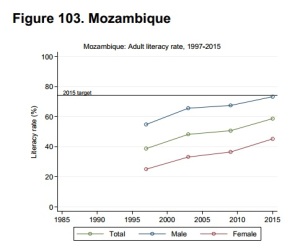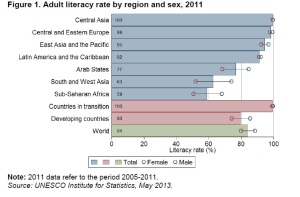Mozambique is a place of extremes – extreme heat, extreme poverty, harsh landscape, harsh beauty (Just look at the parched sand as the dusk hits the horizon. It’s hard to deny.) What about the extreme differences that exist between a man and a woman? Well.
They too exist. The battle between the sexes is never far from my mind as anyone can attest who has entered into conversation with me over business, books, competition, or the old favourite, strength & sports. No I don’t think that women cannot be firefighters or weight lifting champions but are they able to do this as a general rule?
While I could spend time talking about whether an Olympic skier could flash a faster time if s/ he was male or not, or even about whether people like Adi Zarsadias are giving feminists a bad name because she thinks being a traveller makes her self-aware, subsequently emotionally unavailable, thus superior (https://medium.com/better-humans/802c49b9141c … I’d rather discuss the apalling statistics that show how far we still need to go when it comes to the basics.

From my second day of being in Nampula, I was greeted by local girls eager to speak Portuguese to me, despite my lack thereof and the friendliness was far from unwelcome. When you’re a foreigner, every bit of that smile is like pure happiness. No matter how many times I move to a new place, I will never get used to that first 30 days.
Adaptable? Yes. Familiar? Yes. Comfortable? No.
The women are kind and they have an enthusiasm about meeting new people which is unmatched. My meagre “obrigada” And “Tchau! Até mais!” was not snivelled at, rather celebrated. Women not only are sweet, but they do a lot of the labor. After a few days you will notice that the ones standing in front of a fruit stand or carrying water from a well are the females, and not the other way around.
But for such a hard-working gender, they are unfortunately side-tracked for what the men want in Mozambique. While many traditions are practiced by both genders, such as, the performance of the Makhuwa dance, many are not. Men build. Men are hired as laborers of industry and construction. Men can be managers. Women farm, clean floors, and wash clothes. There is a dichotomy that not only creates a gendered division of labor, but an inequity in treatment. If one’s choices are limited because of the way others see an entire sex, there is little freedom and precious little autonomy.
Note a few of the more intriguing rituals. Some Northern traditions include a widow shacking up with the youngest brother of the deceased to ward off evil spirits. Despite the temporary nature of the hook-up, it is still quite unusual. Initiation from girl to woman may include a ceremony of de-flowering not of a female’s choosing when entering a tribe of males who have just been circumcised in their rites departing boyhood.
While the details of such traditions are far from common knowledge, recent digging has led to the unfortunate conclusion that some of the results or implications of these rituals reveals high prevalency of infectious diseases such as HIV/AIDS and low literacy rates, especially for girls. While patriarchal systems in place are not fully to blame for these consequences, it does seem that the value men place on men does allow women to easily be second or third priority.

As much as I’d like to discuss how females should seek independence and free speech, this division between men and women is more than simply a figurative battle – it affects the women here because of their low level of education, access to career opportunities and most significantly lack of human rights preservation. So it needs to start with the foundation – learning how to read and write. The literacy rates of Mozambican youth have actually increased in recent years, which is promising for the next few years as many countries such as Brazil, Portugal, Canada and China have begun major development projects in natural gas and coal. If the youth increase their knowledge, there is serious hope for Mozambique to use its newfound economic wealth to build this country.
The Sub-Saharan region, in general, has much to gain from increasing their primary and secondary school enrollment rates. While Mozambique is not at the bottom of the list of these African nations, there are only a few countries, like Guinea, Niger, and Liberia which have lower literacy percentages, especially for females.

The longer I am here, the more compelling it is to understand what the blockades are to the success of the Mozambiquan peoples and how this can be promoted. While living in this place is a far cry from the ‘white girl smiling with the cute baby on an African safari’ stereotype, presence in Mozambique as a non-indigenous, non-native, non-pan African even…I have much to learn. There must be ways in which this beautiful country can rise up to sustain itself and progress forward. Until that day comes, suppose it is only natural to wonder how one might at least be part of the discussion. I’m impressed with the enthusiasm with the people and continue to be humbled by the ways in which all of them survive. It would be arrogant to assume I could do much at all, especially since I don’t belong here. I have very little knowledge of their real needs. I do know this though.
At least for today, the conversation is being directed against the tried and true typical female empowerment conversation but at giving women the chance to even be part of the larger, global battle of the sexes. Put them in a place where they can read, express themselves, and then they can deal with the ugly bit of politics between men and women. It’s only just that they be part of that disaster as well.
Photography Credit (at top): Chris Tobin, Digital Vision)

